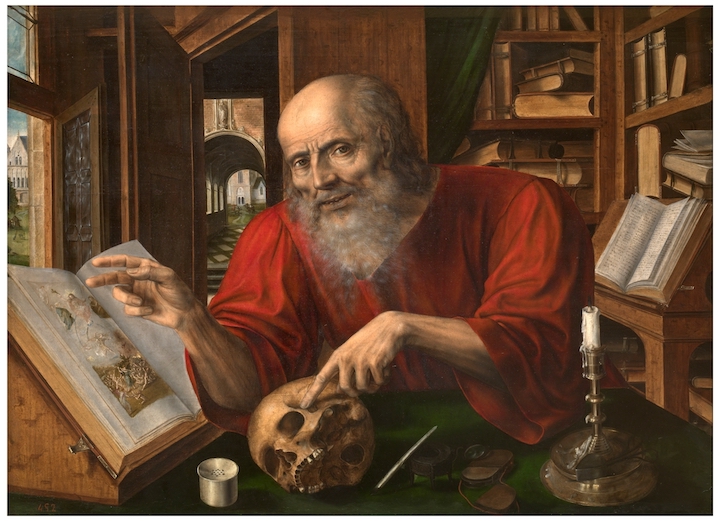In 2019, the pope designated this day, the 3rd Sunday in Ordinary Time, as Sunday of the Word of God. The initiative doesn’t seem to have gained much attention in the pews, probably because most Catholics haven’t been in the pews for the past two years. There’s also the question, “Well, what else would Sunday be about if not the Word of God?”
The entire Mass is about the Word, in our prayers, in our readings, and on the altar. Which, of course, emphasizes the pope’s specific intention for this day – namely, increased attention and devotion to Scripture, the written Word of God. Today’s readings in particular teach us how to hear the Word of God within its proper place and native habitat, which is in the Liturgy.
The first reading (Neh. 8:2-10) describes a primitive Liturgy of the Word. Some see it as the beginning of the Liturgy of the Word in Judaism, and hence in Catholicism. The elements are familiar to us. The people gather as an “assembly.” The priest Ezra reads to them from the Law (i.e., Genesis, Exodus, Numbers, Leviticus, and Deuteronomy). He then explains the text. He even stands on a platform, a makeshift pulpit, built for the purpose. He reads and preaches “from daybreak till midday,” which may also capture how some homilies make us feel.
From the assembly, we learn how to listen to the Word of God at Mass. “All the people listened attentively to the book of the law.” This occurs after their return from the Babylonian exile. Here is the Word of God that they had longed to hear proclaimed. Here is the account of their own history, of who they are, and of what God has done for them. Here are the words that, had they heeded them, would have delivered them from their conquerors. So, they don’t listen as a disinterested party or as though the text is some interesting relic of the past. They find themselves “in” the Word and know themselves through it.
They also respond. “All the people were weeping as they heard the words of the law.” Perhaps they weep because they hear what they had longed to hear, and in their own land no less. Perhaps it’s because they hear of God’s goodness and of his warnings against the rebellion that led them into exile. Whatever the case, it is an invested response, one that indicates a deep union between the Word and the assembly.
We should find ourselves in Ezra’s assembly. When we hear the Word of God at Mass, we shouldn’t do so as detached, aloof listeners. The readings aren’t just an interesting historical narrative or ancient philosophy. They are about us as God’s people. They describe the human condition, the ongoing struggle we experience between God’s goodness and our weakness. We should see and hear ourselves in the searching, fickleness, and rebellion of the Israelites, in the joy and sadness of the Psalmist, and in the virtues and vices of the early Church.

So, in listening to the readings at Mass, please – please – don’t sit in the pew with your arms stretched out and your legs folded as though the proclamation of God’s Word were intended for your entertainment or intellectual interest or subject to your approval. The Word is about you and the God who saves you. Sit attentively, intent on hearing His Word not critiquing it. And ask the Spirit to help you receive the truth that saves.
The conclusion of the first reading is instructive. Ezra and Nehemiah try to stop the people’s weeping by exhorting them, “Do not be saddened this day, for rejoicing in the Lord must be your strength!” Indeed, no matter how difficult or challenging the readings may be, joy and gratitude are always the proper response to God’s word.
For this reason, after each reading Mother Church has us respond, Thanks be to God. Notice that this response is given regardless of how easy or difficult, how consoling or challenging, the reading may have been. We don’t get to choose a different response if we don’t like the reading. No, the response is always one of joy and gratitude. Thanks be to God. Speak those words deliberately and intentionally, not as a knee-jerk Catholic liturgical reaction. By saying them, you affirm the truth and goodness of God’s Word. . .no matter how irksome you might find it.
Fast-forwarding some centuries after Ezra, today’s Gospel gives us the account of the synagogue’s Liturgy of the Word on one particular sabbath. Our Lord is there, and he observes all the liturgical protocols. Like Ezra, he reads the Word and then interprets it. And that’s when things change drastically: “He said to them, ‘Today this Scripture passage is fulfilled in your hearing.’” With that, he invited them to believe in the Word of God not ultimately as a written scroll, but as his very person.
“Today this Scripture passage is fulfilled in your hearing.” These words are not relegated to that one moment in the synagogue in Nazareth. They hold true at every Mass. It’s not just that one passage fulfilled at that one time. All of God’s Word has been fulfilled and continues to be fulfilled in him. Christ is the continuing fulfillment of the Word we hear. His fulfillment of it confirms that God’s Word is entirely worthy of our attention and trustful response.
*Image: Saint Jerome by Jan Massys (workshop of), c. 1530-40 [Museo del Prado, Madrid]
You may also enjoy:
Pope Leo XIII’s Scripture Is the Bulwark of the Church (from Providentissimus Deus, 1893)
Anthony Esolen’s Our Sophisticated Bible Translators















